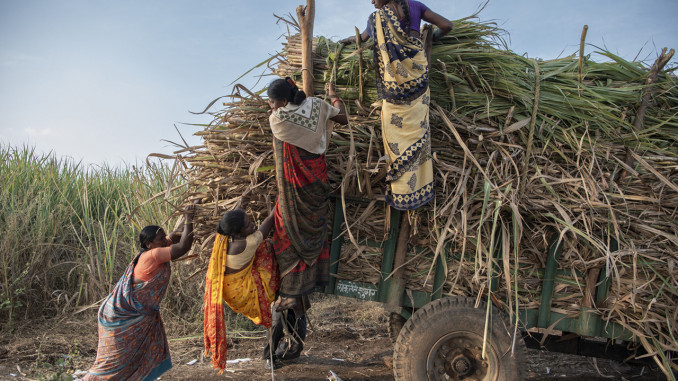
For centuries, the sugar industry and the slave labor system that produced the world’s sugar, shaped the global economy and condemned millions – from Brazil, the Caribbean islands, Louisiana and more – to short, brutal lives of labor. Now, a recent New York Times and Fuller Project investigation entitled “The Brutality of Sugar: Debt, Child Marriage and Hysterectomies,” describes in detail the lives of hundreds of thousands of women in 2024 Maharashtra, India, who are still the victims of forced labor in the service of sugar production for multinational giants like PepsiCo and Coca-Cola.
Throughout southern and central India, contractors pay deeply impoverished and generally very young migrant workers in advance for an entire harvest season, about the equivalent of U.S. $5 per day. Women often marry young, in their early to mid-teens, so that husbands and wives can work together during the labor-intensive harvest period. But very often the contractors who manage them tell them they are still in debt at the end of the season. This puts women and their families in a bind, forcing them to continue working beyond the contracted period simply to pay off debt. One contractor told reporters that there is “no possible way” families can pay off the debt from their advance in only one season. Another said that he’d paid for both marriages and medical bills, but that “I just add the amount to the next year’s bill, and they can work it off.” One woman said she initially thought she and her husband would work in the fields for just one year. She has now been there for 15 years.
Sugar harvesting is already a brutal process and in general causes numerous physical ailments that lead to shortened lives. Harsh labor is made worse by lack of infrastructure for hygiene, housing and more, which is all primitive at best. It also leads to the high number of hysterectomies, not because they are necessary, but because they allow women to continue working unimpeded by menstrual cycles and routine gynecological care. According to one government official, “the thinking of women is, if we get the surgery, then we’ll be able to work more.” Even if many do not want the procedure on their own, contractors often recommend and encourage the procedures. Of the 82,000 women workers surveyed for a recent local government report, at least one of every five, most in only their 20s or 30s, had undergone hysterectomies.
Coca-Cola has been fully aware of this situation since at least 2019, when its consultants toured plantations and found consistent examples of child labor, in some cases with children as young as 10. But they and Pepsi blame local governments, local subcontractors, and the supply chain for the lack of accountability. This dishonesty is the typical multinational response to horrific labor conditions, and allows them to play ignorant despite knowing precisely how their ingredients are being produced.
However they justify it or try to ignore it, hundreds of thousands of workers in just one region of India are in a system of bonded, coerced, or forced labor that in reality is near outright enslavement. This sugar production system is driven from the top by the pursuit of profit by a handful of multinational corporations and driven at the bottom by the dull compulsion of economic necessity for at least hundreds of thousands. It is a completely normal part of the global capitalist economy, and yet another example of why this inhuman system must be overthrown.




